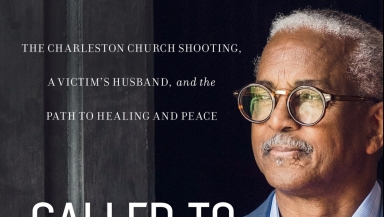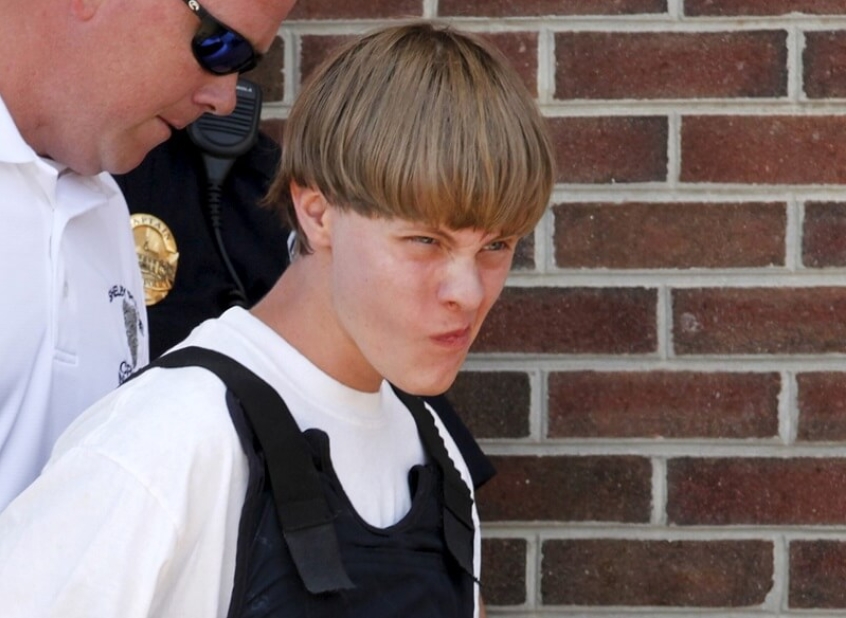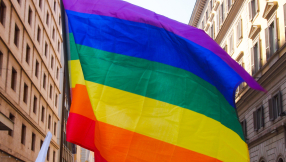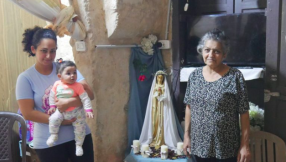
On the evening of June 17, 2015, Myra Thompson was leading a Bible study at the predominantly black Emanuel AME Church in Charleston, South Carolina. When a young white man, Dylann Roof, turned up at the study, he was welcomed in by the group. But as the study drew to a close and the church members bowed their heads in prayer, Roof pulled out a gun and opened fire.
Myra was one of the nine African Americans who lost their lives in the massacre, a tragedy that shook Charleston and the black community across the US.
She was survived by her husband, the Rev Anthony Thompson, who in spite of his enormous loss, forgave Roof and has devoted his life to preaching a message of forgiveness.
It's this message that is at the heart of his new book, Called to Forgive.
Rev Thompson speaks to Christian Today about the legacy of his beloved wife, Myra, and what he wants every person to know about forgiveness.
CT: Before we talk about the book and the theme of forgiveness, what was it about Myra that made her such a special woman?
Rev Thompson: Myra was an extraordinary woman. She was a teacher, a counsellor and a minister. She never treated anyone like a stranger and everything that she did or pursued was for the benefit of other people.
She became a teacher because she felt the need to help the disadvantaged. Those others saw as troubled children, she saw as people with opportunity in them. She saw kids who had experienced things in life and could look beyond the drama. She recognised that they did some of the things they did simply because it was a defence mechanism.
She was teaching in one of the worst schools in South Carolina, where the kids would curse and disrespect you. But she won the respect of the kids. She went to their homes, got the parents involved, and later, when she got a Master's in counselling, the school had to hire a second counsellor because so many kids were coming to her for counselling.
Myra was the kind of person who changed people's lives. She saw a need and would try to find a way to fulfil that need. And she did that in the community, in the church and in the home. I thought I knew a lot about loving somebody but when I met Myra, I discovered the real definition of love because she was such a loving person.
CT: Thinking back to when you found out what had happened on the night of the shooting, and that Myra had died, can you describe how you felt in that moment?
Rev Thompson: Myra and I did everything together but for some reason, she didn't want me to be there at her Bible study that night. She was very adamant about it.
She was teaching at Emanuel AME but because she didn't want me to join the study, I went instead to our church, Vacation Bible School. When I returned home, I got a call from someone telling me that there had been a shooting at the Emanuel AME church. I was down there in about five minutes and the first thing in my mind was, I hope my wife was nowhere around when the shooting was taking place.
The area was all cordoned off and a policeman directed me to a hotel across the street where they had taken the survivors. When I opened the door, I could see some of the survivors and they were crying. I was trying to find Myra but I couldn't see her.
That was when one of the survivors told me that Myra was gone. At first I didn't believe it, I thought she meant that Myra had just gone somewhere and was coming back in a moment. But she said, "No, Myra's gone and she's not coming back."
At that moment, I ran outside and knelt down in the flowerbed just praying that her spirit was ok, that she wasn't suffering and that the Lord would show me a way to get over to that church. In that moment, I heard a voice saying "get up" so I got up and went to the church, but as I got to the door, somebody pulled me back to stop me from going in.
When that happened, I fell down on the pavement crying uncontrollably. I kept saying over and over again, "I don't know what to do," and I told the Lord I was ready to throw the towel in, that I wasn't going to church on Sunday, I wasn't going to preach anymore. But I heard God say, "Get up." And He reminded me of the many times I had told my congregation that if they were to lose someone they loved, and if they cherished that person more than the Lord, then what would they do?
I didn't want to hear that message at the time, but it just kept coming at me. I got up and I realised that I have to go back and tell my congregation that I'm ok, that in spite of losing my wife, I have to continue to trust and believe in the Lord.
CT: You publicly forgave Roof. How hard was that?

Rev Thompson: The Lord gave me Scripture from Luke 17, when Jesus said to his disciples: "Things that cause people to stumble are bound to come, but woe to anyone through whom they come. It would be better for them to be thrown into the sea with a millstone tied around their neck than to cause one of these little ones to stumble. So watch yourselves. If your brother or sister sins against you, rebuke them; and if they repent, forgive them. Even if they sin against you seven times in a day and seven times come back to you saying 'I repent,' you must forgive them."
Forty-eight hours after I received that Scripture, Dylann was caught and a bond hearing had been scheduled. I didn't want to go, I didn't want to see his face, but my daughter convinced me to go. Even after I got there, I didn't want to be there and I had even told my kids not to say one word during the hearing.
But when the daughter of another victim, Ethel Lance, stood up and forgave Dylann, we were invited to speak too and a voice came to me telling me to get up. So I got up even though I didn't feel like I had anything to say. As I was walking to the podium, God was telling me that I was a sinner too. To be honest, I didn't want to stand up there and tell anybody I was a sinner! But God was telling me, you're a sinner too. And He reminded me that although Dylann killed my wife, there were some things I had done too; that I was also a sinner, and that I should forgive Dylann just as I had been forgiven by God. He convicted me that Dylann is a child of God just like I am.
In that moment, when I was standing at the podium, I remember speaking to Dylann as if there was nobody else in the room except him and me. I said, son, I forgive you, my family forgives you, and we would like you to take this opportunity to repent, confess and give your life to the one who matters most, Christ. When I said Christ, he looked up, so I know he heard.
CT: Did you feel different after you forgave Dylann?
Rev Thompson: As soon as I got through telling him he was forgiven, my body began to shake. I could feel something pulling down through my fingers, like pins and needles. I was light as a feather and all I can remember is experiencing absolute peace. I was so peaceful. It was like God had seen in my heart; the anger, the pain, the burden, the grief, and He healed me from the inside out and gave me His peace.
That peace is real. I've preached many times about the peace that surpasses all understanding, and I thought I had it already but it came to me that day and I still have it. It's the peace God gave me to enable me and my family and my church to move forward.
And as I was walking away from that podium, I heard Him say that now I have a new mission. Because before, I didn't know what to do and felt like I had no more purpose anymore. From that moment on, I had a new mission, to spread the Gospel of forgiveness. God gave me peace and a new purpose, and enabled me to move forward in my life. That's the power of forgiveness.
CT: Do you feel that forgiveness is something you have to do again and again? Do you ever feel those feelings of anger resurfacing again?
Rev Thompson: No, God took it all away; from that moment it was gone. That's what forgiveness does. During the trial, a news reporter from Time magazine heard Dylann say that if he had the opportunity, he would do it all again. The reporter asked me whether, because Dylann had no remorse, I would therefore take my forgiveness back. I said no way, because taking my forgiveness back would be like giving my peace back, and I want my peace. So no, I never had to forgive him again. I forgave him and it is done.
CT: Some people struggle with forgiving others because the person who hurt them, like Dylann, has never said sorry. How do you forgive when the perpetrator hasn't sought forgiveness?
Rev Thompson: That's what you call secular forgiveness, or worldly forgiveness. With secular forgiveness, society believes that in order to forgive, you first need to understand why someone broke a law against you. But we don't need to understand it all in order to forgive. Some people believe that the one who hurt them should acknowledge their sins and apologise before they forgive, but we can forgive without first receiving that from the offender, because Luke 17 says no matter how many times our brother sins against us, forgive them.
Forgiveness is a choice. It is not based on how we feel or our emotions, because we cannot do it without God. I was not able to forgive Dylann without God intervening. I did not want to go to that bond hearing but He told me to go. I did not want to get up and say something but He told me to get up and say something. So He intervened to make that happen.
Nobody can forgive on their own. I have had people say that they want to forgive this person but that they can't bring themselves to do it. It's good that they have the intention and want to do it, but they first need to go to the Lord and say, Lord forgive me and help me to forgive this person too. Then they will be able to do it. It's not something they can do without the help of God.
And we have to forgive people in order for God to forgive us. People pray for forgiveness and think that they are forgiven, but you are only forgiven if you forgave the person who did you wrong. That's how we are forgiven. So I urge people to forgive so that God can forgive them, because in Matthew, Jesus taught His disciples how to pray and part of that was to ask God to forgive their trespasses as they forgive those of others. If we don't forgive their trespasses, God won't forgive ours.
CT: Dylann Roof was sentenced to death. How does that sentence make you feel?
Rev Thompson: I do not believe in the death sentence. Prior to the trial, our attorneys came and talked to each family about trying to get the death penalty, and I told them very specifically that I do not believe in the death penalty. However, that's the route they took and that's what happened. My hands are tied when it comes to the law. I don't agree with the sentence but that's the sentence he received.
My thing is that God told me to forgive Dylann and let Dylann know what he needs to do to be forgiven, so that his life will be better in case that death sentence comes to pass. I believe God wants Dylann to change his life before that comes to be. He has an opportunity to do that and I would rather him have the opportunity to sit in jail and do just that, and form a relationship with the Lord before he leaves here. Because my wife would want that very much. She would want to see him come to the place where she is in Heaven and she would love to say, I'm glad you made it here.
CT: So you believe Myra would completely forgive Dylann?
Rev Thompson: I know she would. That's her, that's just the way she was. And I know that's what God wants. People get hurt by the wrongs other people do to them. I was hurt, my soul was just torn apart, and I didn't really know what to do. I just wanted to give up on everything.
For some other people, maybe they want to take revenge and get the person back. But I want to let them know that this is not a good way to go. Our human instinct is to take revenge. We think that by doing this, we'll get some satisfaction, but it's only going to hurt you and hurt your life. The more you plot to bring harm to someone else, the more harm you bring into your own life. The more you hold onto anger, the more miserable your own life is going to be. Even doctors are coming to believe that unforgiveness ruins your physical health, that physically, you are killing yourself. It's like trying to get someone back but then drinking the poison yourself. You only end up killing yourself.
CT: What changes have there been in Charleston since this tragedy?
Rev Thompson: Forgiveness healed me and it's healing our community. South Carolina was actually the first state to secede from the Union because of slavery, and slavery was prevalent here in Charleston; they earned money and profited off the backs of slaves.
Even to this present day, before this tragedy, there was an undertone of racism in the city. But since this tragedy, things have changed. The community has been united. People from all walks of life, every race and creed, have united. They have tried to help in any way they could and reach out to console others and be there for each other.
And then the Confederate flag came down at a time when we weren't even talking about the flag. I had been one of the people marching around speaking against that flag for years and they would never take it down. But through this act of forgiveness - the families forgiving Dylann - the flag came down.
One time, I gave a talk at a predominantly white church about being the light of the world and needing to confess and repent of our sins. A white lady about my age stood up and confessed that she had been a racist but she repented of it when she heard that we forgave Dylann.
So things like that are happening in Charleston. People are re-examining their lives and we're reaching across cultural and racial boundaries. We're trying to break these walls down and stop defining each other by the colour of our skin. We're seeing each other in a different light, as neighbours. That's what's happening in Charleston.
CT: The title of your book is Called to Forgive. What is it you hope people will get from reading it?
Rev Thompson: I want people to realise that no matter what tragedy comes into your life, whether expected or unexpected, and no matter who treated you wrong or slandered you, abused you, made you feel angry, made you feel mad; those feelings are human nature and I understand that, but don't do what your human nature wants you to do. Don't make the mistake of thinking that taking revenge will bring you peace; it won't. Holding onto the anger towards someone who wronged you will only make you feel miserable. And you will get to the point where you're no longer feeling miserable because of what they did to you, but because of your response towards what they did.
Forgive them. We all have been called to forgive, more for ourselves than for the person who hurt us. Forgive them so that you can receive the peace and comfort of God - the peace that you need to carry your life forward. Forgiveness is the only way you will get that.
I've done a lot of public speaking since this tragedy and I met a lot of people who didn't even know it was possible to forgive someone without that person apologising first.
God wants to use me to spread this message so that people can receive the peace they're looking for. It only comes through forgiveness. Turn to the Lord and He will give you the peace you're looking for. And He'll take care of those who did you wrong because "revenge is mine sayeth the Lord".













